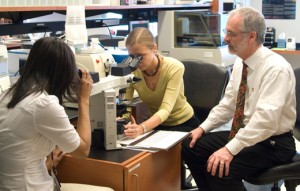Years from now, physicians may be able to determine whether you’re at increased risk for colon cancer by drawing blood from the tip of your finger.
Emory University researchers are working to identify biomarkers to detect a person’s chances of developing colon cancer. Much like blood pressure and cholesterol tests can indicate heart disease risk, researchers here hope that some day the makeup of blood and urine will be able to tell who’s at risk for colorectal cancer, why they may be at risk and what they can do to reduce their risk.

For now, the Emory study team is analyzing the rectal tissue samples of people with colon adenomatous polyps, non-cancerous growths considered precursors to colon cancer, and comparing them to rectal tissue samples from people who don’t have polyps. They’re also looking at whether the differences they detect in rectal tissue can also be found in blood or urine. Currently, no accepted tests exist to determine whether someone may be at risk for colon cancer.
“Most people would rather provide a blood or urine sample than get a rectal biopsy,” says Robin Bostick, MD, MPH, Rollins School of Public Health epidemiology professor and study principal investigator. Bostick is also a clinical faculty member at the Winship Cancer Institute at Emory and a Georgia Cancer Coalition Distinguished Cancer Scholar.




